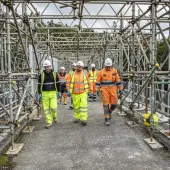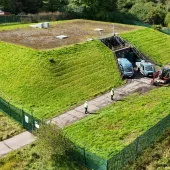SCA hosts sustainability industry day
Last month (11 September) saw the Structural Concrete Alliance (SCA) hold its Sustainability Industry Day in London, bringing together around 60 attendees from the concrete protection and repair industry.
The event, sponsored by the Concrete Society, featured a series of presentations chaired by Professor Paul Lambert of Mott MacDonald. The Alliance consists of the Concrete Repair Association (CRA), the Corrosion Prevention Association (CPA), and the Sprayed Concrete Association (SCA).
Will Arnold from the Institution of Structural Engineers spoke about the role of concrete structures in climate change and biodiversity loss. He discussed how to mitigate these impacts by focusing on embodied carbon and promoting more efficient designs that use less material and specify low-impact options. Arnold also mentioned the introduction of the UK Net Zero Carbon Buildings Standard, with a pilot version currently live.
Fergus Harradence from the Department for Business and Trade provided a government perspective on initiatives aimed at improving sustainability in construction. He discussed the government's ten-year infrastructure strategy, addressing how the skills shortage affects productivity and the need to decarbonise construction material production. Harradence announced an additional £6.6 billion investment in retrofit projects, raising the total to £13.6 billion. He stressed the importance of attracting new talent to the industry, particularly those affected by redundancy at different career stages.
David Offord of Onsite Central examined the challenges faced by the private sector in adopting sustainable practices amid regulatory requirements and the need for emissions reduction. He covered the Sustainable Development Goals (SDGs) and the Transition Plan Taskforce (TPT), explaining the Environmental Product Declaration (EPD) process and the significance of Energy Return over Energy Invested (ERoEI) as a measure. Offord highlighted the importance of setting science-based targets and implementing business systems for environmental reporting.
Chris Wozencroft from Corrosion Engineering Solutions discussed the corrosion resistance of concrete made with low-carbon cements. He noted that 60% of the embodied carbon in construction is due to materials and explained that steel rebar in concrete typically does not corrode. However, he raised concerns that low-carbon cements could change this dynamic, presenting potential risks. Wozencroft emphasised the need for more research into the long-term durability of new materials and their deterioration mechanisms.
Dr Said El-Belbol and Natalie Bird from National Highways shared insights into their Net Zero Carbon Road Map, focusing on how they manage emissions during construction and maintenance. They expressed a willingness to consider well-tested innovative materials, while highlighting that their concrete decarbonisation roadmap requires careful negotiation on project design to reduce material usage. They aim to implement material carbon reduction strategies by 2030, with expectations for carbon capture technologies and alternative fuel sources to evolve in the cement sector beyond that date.
The day concluded with a Q&A session led by Professor Lambert, who addressed questions regarding EPDs and the cultural and ethical drivers of sustainability. Following positive feedback from participants, the Alliance plans to organise another Industry Day in early 2025.







